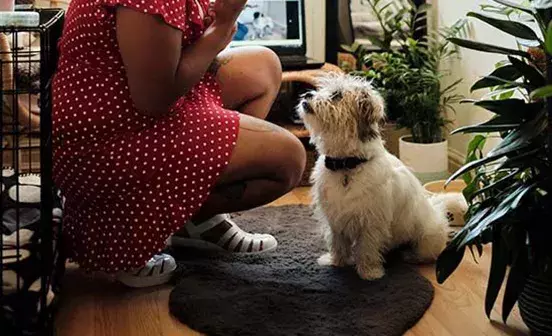We all love our dogs, but sometimes we might need some help to understand or to deal with some of their behaviours and quirks. This is exactly what a dog trainer, or a dog behaviourist can do.

Whether you want help to teach your dog new skills or useful behaviours such as general obedience and good manners, or you want to know how to help your dog feel better about spending time away from you, a trainer or behaviourist will be able to help.
Their work might cross over, but dog trainers and dog behaviourists deal with slightly difference things, so to begin with, let’s look at what the difference is between a dog trainer and a dog behaviourist
What do dog trainers do?
- Teaching new/useful behaviours like sit, stay, recall, loose lead walking, scent work, agility etc
- Socialising a new puppy
- Group or individual classes for general obedience and manners
- Finding fun and exciting ways to keep your dog mentally and physically stimulated
What do dog behaviourists do?
Analysing, diagnosing and helping to change problem behaviours such as:
- Separation anxiety
- Aggression
- Overstimulation
- OCD/compulsive behaviours, stereotypes

How to find a qualified dog trainer or behaviourist
Qualified dog behaviourists should work on veterinary referrals, so be sure to consult your vet. Getting your dog checked over by a vet first will also rule out any potential medical reason for problem behaviour(s). It may be that your vet diagnoses something which can be solved without the help of a behaviourist, but if needed they may also be able to recommend a behaviourist they have worked with previously. Some insurance companies include packages that cover support from certified dog behaviourists, so this is something to consider when shopping around for insurance for your puppy or dog.
When looking for a dog trainer it’s a good idea to ask for recommendations from fellow dog owners in your area and look for reviews and references. When you find an individual or a training class in your area that you like the sound of, be sure to ask the following to find out as much information as possible to determine if they would be a good fit for your dog’s needs:
- Ask about their experience, background and any qualifications they may have that enables them to be able to help you with your dog.
- What insurance do they have? If your insurance provider covers the cost of a behavioural consultation that’s great, but does the behaviourist have liability insurance should anything go wrong whilst they are working with you and your dog out and about?
- Find out what training techniques they use. Battersea advises using only positive, reward-based techniques as they focus on strengthening the bond between dog and owner. These methods also build your dog’s confidence by giving them choice and means the behaviour changes are more likely to last and become habit. Using methods based on punishment can reduce confidence and inadvertently cause issues such as fear-based aggression, and damage the relationship between dog and owner.
- Always ask for information regarding costs and what is included. For behaviourists, do they offer an hourly rate or a package deal with follow up consults? Do you get a bespoke behavioural report written up and sent to you? Do you get a training plan to follow with clear, set goals to achieve? Do you get email/telephone support from them as needed? If it’s a class, how much is it per session, and is there any outside or ongoing support available?
- If you are looking for a dog training class, ask about their set up. Some questions to ask could include:
- How many dogs are there?
- What is the ratio of dogs to trainers?
- Are the classes conducted mainly with dogs on-lead?
- Do they allow bitches in season?
- Do they check the vaccination status of dogs on their courses?
- Do they have any provisions in place for slightly more reactive dogs e.g. temporary visual barriers?
There are several factors which could impact you and your dog being able to learn effectively in a class environment. Good trainers will look to keep classes quite small with ample space between dogs. This will allow them to give each client enough attention and support during sessions.
Most importantly, you should feel comfortable speaking to the trainer or behaviourist. They should be approachable, knowledgeable, easy to talk to and happy to answer any questions you may have about their services. Communication is key to this relationship.
Finding a dog trainer or behaviourist near me
There are lots of training and behaviour organisations with different accreditations in the UK. We offer lots of advice here on the Battersea website and on our YouTube channel, but if something changes and you feel like you need more support, get in touch with your vet and don’t be afraid to ask for help. Below are some links that you may also find useful in your search for a dog trainer or behaviourist. Battersea encourages you to do thorough research into each organisation or individual’s ethos when looking for a canine professional in your area and make sure that they are right for you and your dog.
Association of Pet Behaviour Counsellors (APBC) www.apbc.org.uk
Animal Behaviour and Training Council (ABTC) www.abtcouncil.org.uk
The Association of Pet Dog Trainers (APDT) www.apdt.co.uk
Pet Professional Guild (PPG) www.petprofessionalguild.com
Institute of Modern Dog Trainers (IMDT) www.imdt.uk.com
Download this guidance as a handy advice sheet for reference:



